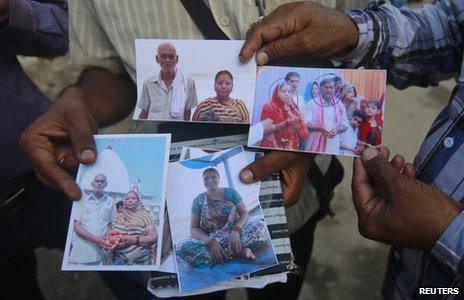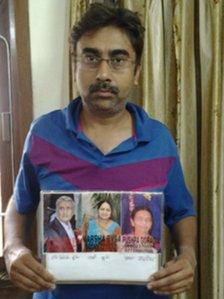India floods: The search for missing victims
- Published

Officials say some 3,000 people are missing
As India begins to wind down the rescue operations in flood-hit Uttarakhand state, the focus now shifts to families searching for the missing, reports the BBC Hindi's Vineet Khare from Rishikesh.
"Please help me find my brother. He is everything to me," a teary-eyed Indu Sindhwani implores me.
We are standing outside a crowded bus station in the holy city of Rishikesh in the northern Indian state of Uttarakhand, which has been ravaged by floods and landslides in the last fortnight.
Deepak Sindhwani, who had gone for a pilgrimage to the temple town of Kedarnath, is among some 3,000 people who, officials say, are still missing after the disaster.
More than 800 people are reported to have been killed so far, but the exact number of deaths, say officials, may never be known.
Mr Sindhwani spoke to his sister last on 16 June and said he was trapped in Kedarnath after a bridge collapsed. After that, his phone went dead.
Since then, Ms Sindhwani has been unsuccessfully running from pillar to post to get information about her brother's whereabouts.
'No answers'
Nilesh Ninav, 39, has been camping in Rishikesh for the past fortnight to look for his parents, Dattatreya Ganapat and Lata.
They spoke for the last time on 15 June when his parents rang up to say that they were caught in a traffic jam.
"I have been running around trying to speak to officials, but I am not getting any answers," he said.
Officials admit they have no easy answers to help the distraught relatives of the missing, whose faces are plastered on the walls of railway and bus stations and on billboards and vehicles in Rishikesh.

Mitesh Goradia has been searching for his mother and cousin
Swollen rivers have swept away entire villages, where there were many travellers in what is the peak tourist and pilgrimage season.
Several bodies, which were found in a highly decomposed state, have been cremated in the affected areas. Many bodies may have been washed away or remain buried under debris.
"The families want to know the real picture. But considering the scale of the disaster and with so little information available, we cannot give them a definite answer," says Piyoosh Rautela, a senior disaster management official.
A helpline set up for the relatives of the missing has received more than 25,000 calls so far. Officials say the number of calls has reduced, possibly as many people have given up on finding their relatives.
But people like Mitesh Goradia from Gujarat are not giving up yet.
Mr Goradia and his brothers flew to the state capital, Dehradun, looking for their mother Pushaben, cousin Jayprakash and his wife Varsha, who had gone on a pilgrimage and not returned.
They have sought help from the police, the army, politicians and officials. They have recorded video interviews on their mobile phones with returning pilgrims who they think may have met their mother and cousin.
"We have proof they were alive till 23 June. We do not know what happened after that - whether they were killed during the rescue or are still in the villages looking for help," he said.
"We will wait until the last person is rescued. After the rescue mission is called off we will go up the hills ourselves and try to find whether my mother is with the locals."
- Published1 July 2013
- Published27 June 2013
- Published24 June 2013
- Published20 June 2013
- Published25 June 2013
- Published22 June 2013
- Published28 June 2013